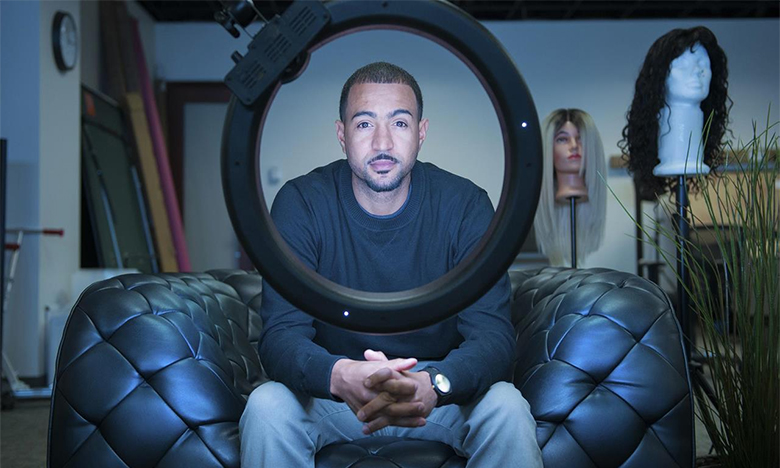The wigs and weaves are hard to miss at Diishan Imira’s office in downtown Oakland. In place of file cabinets and watercoolers are long Naomi Campbell locks and billowing Brazilian tresses with hot-pink tips, perched atop mannequin heads. Far from a colorless workplace, the headquarters of Mayvenn — the Amazon.com of hair extensions — is a vivid love letter to the beauty of Black hair. Exquisite twists, natural hairdos, curls, braids, Afros and everything in between.
Imira’s own cut is pretty fresh — a close Mr. Clean shave — befitting a founder who’s striving to put the $9 billion Black hair market on Silicon Valley’s map. Such “untapped” pastures are ripe for a drastic makeover, says the 36-year-old Imira. Launched in 2013, his e-commerce platform allows more than 30,000 mom-and-pop hairstylists to set up online beauty supply stores for free and to sell bundles of hair extensions directly to their customers; the stylists pocket 15 percent of the commission. The company has raised around $16 million in venture capital and boasts heavyweight investors like Andreessen Horowitz, 500 Startups, Apple’s Jimmy Iovine and tennis queen Serena Williams.
While the business may not sound all that sexy or startup-worthy to some, Mayvenn is making noise inside a traditionally brick-and-mortar industry in which small-business owners often shy away from the burden and expense of carrying such inventory in their tiny neighborhood beauty salons, says Faye Brown, a hairdresser in East Palo Alto with nearly 70 years of experience under her belt.
The process of getting a weave done is, to put it modestly, hellishly complicated. Most hair extensions are imported from China and India to America and then sold to corner beauty supply stores like Sally Beauty Supply, where the sales clerk may not know squat about those hair extensions, how they’re made or where they’re from. Then you, the customer, must bring those store-bought hair extensions to a professional hairstylist who will put them in for you.
The problem is the stylist has zero control over the quality of the weave, plus no way of earning a commission on the purchased hair. Only 5 percent of hair salons and stylists that cater to Black women in the U.S. carry or sell hair extensions, according to the Professional Beauty Association. But Mayvenn eliminates the middleman by sourcing the hair directly from Asia, including China, India and Malaysia, and handling all the customer service and marketing for each and every stylist. “It wasn’t about hair extensions to me, but the inefficiencies in the distribution channel” and putting the power of ownership back into the hands of African-Americans, says Imira. “I’m into helping the little guy, so he can get his.”
Much of the battle for Imira has been getting investors to understand the travails of Black hair and the oft-overlooked opportunities of the market. Try convincing a roomful of men that there is money to be made in women’s hair. Add in the fact that weaves are also “so foreign to most investors here” in the Valley, where African-Americans make up no more than 1.5 percent inside the bulk of venture capital firms, says Imira. He knocked on doors and “thugged it for two years” before anyone started listening. It’s no hidden secret that Silicon Valley is behind — in the way many mainstream markets are in the beginning — on realizing how vast the African-American market is, says Monique Woodard, one of the few African-American female venture capitalists in the Valley. “A lot of people don’t understand the market [Imira] is going after,” she adds.
Investors have missed out on Black trends inside movie theaters, news and the world of video gaming, to name a few. According to the University of Georgia’s Selig Center for Economic Growth, the purchasing power of African-Americans will reach $1.4 trillion by 2020, up from $1.2 trillion in 2016. Yet more than 97 percent of venture capital funding lands in the hands of white, male founders, according to the New York–based digitalundivided. With “his determination, hustle and spirit,” Imira has “been great with little to no resources,” adds Woodard. That might prove useful as Imira faces growing competitors like Vixxenn and Flawless Hair Company.
Inside the Valley, Imira is perfectly positioned to make over the Black hair industry. Born to a family of hairstylists, he grew up in a single-parent household in Oakland, with a mom who raised him to be “independent and free-spirited.” Imira’s father left before he turned 5. His innate moxie led him to China, where he taught English for the Shenzhen Bureau of Education and learned fluent Mandarin. Later, armed with an MBA in international studies from Georgia State University, he worked in Ethiopia for Ernst & Young, where he specialized in international trade and foreign direct investments between China and Africa. He soon became well versed in the logistics of the supply chain and distribution channel — how goods get from A to B — and forged relationships with manufacturers in China. He even made a tidy profit selling counterfeit Chinese sneakers from the boot of his car in East Oakland as a rogue merchant. Furniture, art and, of course, hair extensions came soon after.
“Low-hanging fruit,” shrugs Imira, never the businessman to turn down an offer. And as Silicon Valley continues to turn a blind eye, such fruit is his for the taking.

